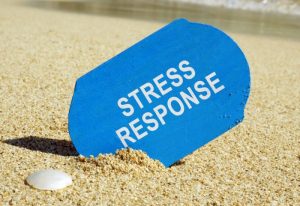When it comes to health, both poor sleep and stress are known to have a negative impact, increasing the risk of developing a broad range of diseases and chronic health conditions. When the two come together in a “sleep-stress cycle,” it can be challenging to deal with. However, a better understanding of how stress affects sleep, improved stress management skills and stress-targeting sleep hygiene techniques can better equip you to successfully meet that challenge and disrupt a negative sleep-stress cycle.
Stress and Its Impact on Health
 Stress is a part of life, and something we all deal with to varying degrees. Stressors – stressful situations, circumstances and happenings – provoke stress responses, a collection of mental and physiological changes that prepare us for the most fundamental response of all: fight or flight in the face of a threat or danger. We’ve all felt it; that rush of adrenaline and other hormones that increases heart and respiration rates.
Stress is a part of life, and something we all deal with to varying degrees. Stressors – stressful situations, circumstances and happenings – provoke stress responses, a collection of mental and physiological changes that prepare us for the most fundamental response of all: fight or flight in the face of a threat or danger. We’ve all felt it; that rush of adrenaline and other hormones that increases heart and respiration rates.
This release of hormones also pushes blood pressure up, increases muscle tension while decreasing pain sensitivity and boosts blood sugar to fuel any emergency or quick actions we may need to take. Cortisol, one of the stress-released hormones, helps divert energy away from less urgent operations, such as digestion and immune function, and toward meeting immediate fight-or-flight energy needs. We experience elevated alertness so we can react fast to the threat or danger we face.
As the perceived threat or danger passes, the relaxation response helps return body and mind to normal functioning. That fast and fleeting stress response pattern is typical of acute stress. Chronic stress is different, involving not a single event eliciting the fight-or-flight sort of stress response followed by a relaxation response, but rather a steady flow of stressors.
That ongoing flow of stress can derail the normal stress response system by disrupting the relax response. The physiological changes that take place in an acute stress situation are not meant to be a long-term thing and when they are, can have a negative impact on the body and on health.
Chronic stress is associated with a higher risk of developing numerous diseases and health conditions, including autoimmune diseases, cardiovascular diseases, obesity, diabetes and more. Chronic stress is bad for mental health as well and is linked to a higher risk of depression. And, of course, chronic stress can contribute to poor sleep quality and sleep disorders.
How Stress Affects Sleep and the Sleep-Stress Cycle
Chronic stress is disruptive to the sleep-wake cycle in a number of ways, contributing to delayed sleep timing, poor sleep quality and reduced rapid eye movement (REM) sleep. One of the mechanisms involved may be the elevated cortisol levels associated with stress.
Cortisol is a hormone that, among its many other functions, is part of our waking up process. Cortisol levels, outside of stress-response level changes, peaks in the morning, decreasing throughout the day and reaching its lowest level at night. Interestingly, insomnia is associated with higher evening cortisol levels. Two common sleep disorders, insomnia and obstructive sleep apnea are linked to high stress levels and chronic stress.
And, here is the reciprocal element of the sleep and stress relationship. A lack of sleep can leave a person feeling more stressed by the demands of their day and more vulnerable to the impact of stress. Thus, the sleep-stress cycle is born. Stress interferes with sleep, a lack of sleep increases stress which, in turn, makes it harder to go to sleep, stay asleep and wake up feeling refreshed.
Manage Stress by Focusing on Better Sleep
Improving stress-management skills, particularly those with a focus on better sleep, is a key element of disrupting the sleep-stress cycle. Exercise, for example, is a valuable stress-management tool. However, it is also an important factor in getting a good night’s sleep. Step away from news and social media during the evening to help you relax ahead of bedtime. Reducing your melatonin-suppressing blue light exposure by not using those devices in the two to three hours before bedtime will also help you sleep better.
 Develop a before-bedtime routine that mindfully seeks to reduce or set aside the day’s stress and shift into relaxation able to ease you into sleep. You may want to take a warm bath, followed by meditation or a mindful deep breathing and conscious muscle-relaxation routine. Keep your mobile phone and other potentially disruptive or stress-inducing electronic devices out of the bedroom.
Develop a before-bedtime routine that mindfully seeks to reduce or set aside the day’s stress and shift into relaxation able to ease you into sleep. You may want to take a warm bath, followed by meditation or a mindful deep breathing and conscious muscle-relaxation routine. Keep your mobile phone and other potentially disruptive or stress-inducing electronic devices out of the bedroom.
Sleep Better During Stressful Times
Sleep hygiene practices can suffer when you’re under stress. Make a special effort to be more rigorous in applying these principles. Use your bed for sleep and sex only, never for worrying and ruminating. Set aside time earlier in the day to think about stressful things.
Go to bed and get up at the same time each day. Don’t consume caffeine within seven hours of bedtime. Avoid alcohol during the four hours before bed. Get bright natural morning light exposure daily and avoid bright light exposure in the evening for better sleep at night.







